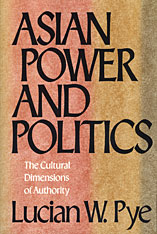
In a major new book, Lucian W. Pye reconceptualizes Asian political development as a product of cultural attitudes about power and authority. He contrasts the great traditions of Confucian East Asia with the Southeast Asian cultures and the South Asian traditions of Hinduism and Islam, and explores the national differences within these larger civilizations.
Breaking with modern political theory, Pye believes that power differs profoundly from one culture to another. In Asia the masses of the people are group-oriented and respectful of authority, while their leaders are more concerned with dignity and upholding collective pride than with problem-solving. As culture decides the course of political development, Pye shows how Asian societies, confronted with the task of setting up modern nation-states, respond by fashioning paternalistic forms of power that satisfy their deep psychological craving for security. This new paternalism may appear essentially authoritarian to Western eyes, but Pye maintains that it is a valid response to the people’s needs and will ensure community solidarity and strong group loyalties. He predicts that we are certain to see emerging from Asia’s accelerating transformation some new version of modern society that may avoid many of the forms of tension common to Western civilization but may also produce a whole new set of problems.
This book revitalizes Asian political studies on a plane that comprehends the large differences between Asia and the West and at the same time is sensitive to the subtle variations among the many Asian cultures. Its comparative perspective will provide indispensable insights to anyone who wishes to think more deeply about the modern Asian states.

“A pacesetter, at the forefront in recognizing the persisting importance of ‘ethnicity as a force both in building nations and in tearing them apart,’ it is also a work of literary merit, crafted by a master wordsmith.” So comments Lucian Pye in reflecting on this classic work in political science and sociology about group identities bending and shaping themselves under the pressure of political change. These transformations seem to have basic similarities, whether they take place in Little Rock or Kenya, Vietnam or Pakistan, Belgium or Biafra.
Isaacs sorts out some fundamentals in forming group identity: the body, names, language, history of origins, religion, and nationality. These are dynamic elements that are melded together but have the possibility of creating new pluralisms.

Lucian Pye, one of the most knowledgeable observers of China, unfolds in this book a deep psychological analysis of Chinese political culture. The dynamics of the Cultural Revolution, the behavior of the Red Guards, and the compulsions of Mao Tse-tung are among the important symptoms examined. But Pye goes behind large events, exploring the more enduring aspects of Chinese culture and the stable elements of the national psychology as they have been manifested in traditional, Republican, and Communist periods. He also scans several possible paths of future development. The emphasis is on the roles long played by authority, order, hierarchy, and emotional quietism in Chinese political culture as shaped by the Confucian tradition and the institution of filial piety, and the resulting confusions brought about by the displacements of these traditions in the face of political change and modernization.
In this new edition Pye adds a chapter on the basic tension between consensus and conflict in the operation of Chinese politics, illustrating the "spirit" in action, and another discussing the great gap that persists between the worlds of the political leadership and of society at large in post-Tiananmen China.
READERS
Browse our collection.
PUBLISHERS
See BiblioVault's publisher services.
STUDENT SERVICES
Files for college accessibility offices.
UChicago Accessibility Resources
home | accessibility | search | about | contact us
BiblioVault ® 2001 - 2024
The University of Chicago Press









